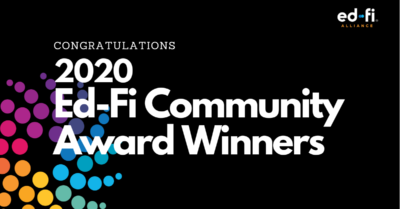
As I reflect on the year that (thankfully) will soon be behind us; two things come to mind. First, I think we’ve all risen to the challenge before us by simply showing up, and by being flexible, prepared and hopeful; and second, I think about the unique opportunity we have to lead fundamental change for the students and educators we serve.
When we go through rapid change and are asked to tackle difficulties, sometimes the most impactful thing to do is to simply show up. Rather than throw our hands up and walk away, what I’ve seen our Community do is to continue our work with a renewed purpose. Nothing stopped, in fact in many ways our work accelerated.
Students, teachers and administrators need more student insights today than ever before. When everything changed, our challenge, as a community founded on connecting data, was to capitalize on the moment and to propel our work forward in new ways. If we thought data was important before, now it has been squarely placed at the cornerstone of education. Data will forevermore act as the bridge to support the incredibly important work of our nation’s teachers. It is incumbent upon us, leaders in data technology, to show everyone else the path forward and to share a vision of what could be- what will be.
Pivot to Meet the Moment
Teachers, administrators, students and parents were forced to pivot to a new normal this year. As living rooms turned into classrooms, and we created the 21st century version of the one room schoolhouse; you worked quickly to help educators meet the moment.
This year we pioneered a new way to rapidly iterate on technology solutions. We launched Fix It Fridays; an open forum and group that convened each Friday to identify fixable challenges and then to quickly fix them. From this work the Community launched Project Buzz and Project Fizz.
A shining example of preparedness and how interoperability pays off in the long run is what the Arizona Dept of Education was able to do in a matter of days to support hundreds of thousands of families across their state. Arizona utilized the real-time data coming into the state over the Ed-Fi API to quickly identify students in need and distribute Pandemic Electronic Benefit cards statewide supporting food security for over 550,000 students and their families.
Despite the heroic efforts of school administrators, teachers and parents the new normal exposed a serious gap and opportunity in how schools and states think about attendance especially with remote learning, blended models and the need to rapidly change between the two. In order to provide concrete practical and technical recommendations on this topic, the Community released Marked Present: Recommendations for Building a Framework to Measure Attendance Data Across Learning Models to support the K12 education community in better understanding student modality, attendance, and engagement data.
Making the Journey Easier than Ever
Knowing that connected data and interoperable solutions are more important than ever before, we set out at the beginning of the year to make the Ed-Fi journey, easier than ever before.
Earlier this year we officially and successfully moved to open source which will deliver highly-functional tools that can be implemented at significantly lower overall costs, fostering even greater innovation and choice in the marketplace. While we know Ed-Fi technologies can be used in a myriad of ways to solve a host of challenges across states and districts, and educator prep programs we also heard from our Community, especially newcomers that the on-boarding experience needed to be streamlined and simplified. To that end, we launched the concept of Starter Kits, that position the use of Ed-Fi into discreet, solvable, and common challenges that can be quickly addressed using Ed-Fi; including Chronic Absenteeism, Streamlining Reporting, Rostering and Educator Program Diversity and Persistence.
Digging into Digital Equity
Not surprisingly the Ed-Fi Community quickly moved to understand digital equity within the new learning models across the nation. Questions related to internet access, bandwidth, device distribution and access, understanding the home learning environment and more were at the top of everyone’s mind.
Thankfully Ed-Fi states, led by Wisconsin and Nebraska, banded together with major SIS’s to quickly identify how the Ed-Fi Data Standard could be adapted to capture critical data to support digital equity in response to COVID.
Recognizing Greatness & Strengthening our Community
As with all things 2020 we needed to pivot from our in-person events to a new virtual format. We launched Ed-Fi Exchange Live and are pleased to report nearly 500 attendees, 40 community-led presentations and keynotes from Sal Khan and Ed-Fi leaders. During the two-day event, over 88% of attendees engaged with our content and platform, making it a highly successful virtual event and connection point for our Community.
Finally, a perfect way to cap this unprecedented year, was to show our gratitude to those Community members that have gone above and beyond is support others and our mission. We were thrilled to announce the winners of the Annual Community Awards earlier this week. We hope you’ll join us in congratulating; Dr. Happy Miller, Lori Ludwick, Google Cloud, Innive and Latika Keegan!
We know you are looking forward to the start of the new year as much as we are, but reflecting on the heroic moments that moved us forward in 2020 is an exercise worth undertaking. Perhaps, through these monumental changes we’ve uncovered something highly valuable, exposing the gaps to allow us to fill them more effectively. This year, unlike any other, has propelled us and compelled us to leave behind practices that no longer serve students and teachers and replace them with the start of something much better, much more efficient, laying the groundwork for many years to come.


